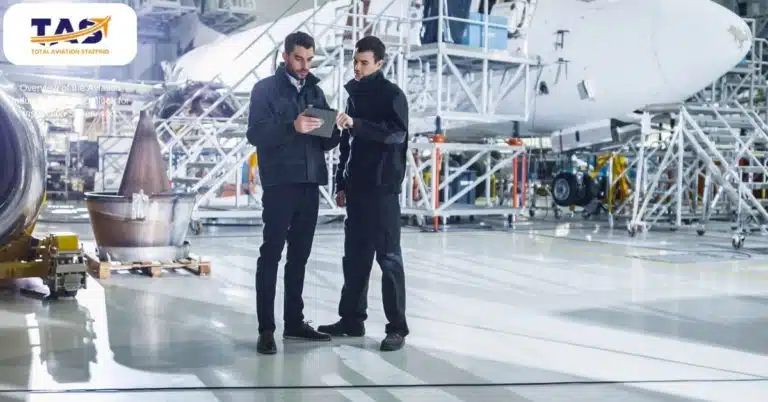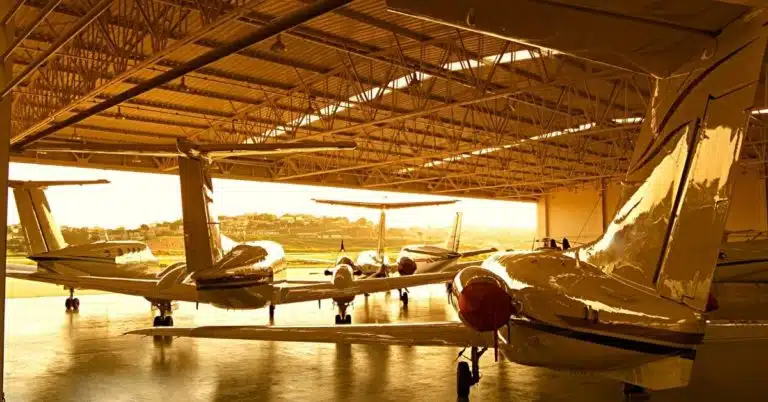The Essential Skills for an Inspection Supervisor in the Aviation Industry

In the aviation industry, safety and quality assurance are paramount for successful operations. An Inspection Supervisor plays an important role in ensuring that these standards are met by overseeing all maintenance inspections and manufacturing processes. To be a successful Inspection Supervisor, it is essential to have certain key skills and knowledge. In this blog post, we’ll outline the essential skills of an Inspection Supervisor in the aviation industry. We’ll look at why these skills are important, what makes a successful Inspector, and how you can develop them. Read on to learn more!
1. Comprehensive Knowledge of Aviation Standards and Regulations
An Inspection Supervisor in the Aviation Industry must have a comprehensive knowledge of aviation standards and regulations. This includes all regulatory requirements, safety protocols, maintenance procedures, and operating rules that govern aircraft operations. They must understand how these standards apply to all aspects of their job, including inspections, repairs, modifications, and other aviation-related tasks. Furthermore, they must be adept at identifying and managing any discrepancies found during inspections to ensure that all aircraft meet required safety standards.
Being well-versed in the aviation industry’s regulations is essential for an inspection supervisor, as it allows them to accurately assess the condition of an aircraft and identify critical safety issues. They must also be aware of any changes to the industry regulations and be able to apply these changes in an appropriate manner. Additionally, this knowledge allows the supervisor to proactively manage any potential risks associated with aircraft operations and maintenance tasks.
A thorough understanding of aviation standards and regulations enables an inspection supervisor to provide guidance and direction on proper safety protocols to other members of their team. This ensures that all aircraft inspections are conducted properly and in accordance with the industry’s standards. This knowledge also allows the supervisor to remain up-to-date on any new developments in the aviation industry and be better prepared to handle day-to-day operations.

2. Excellent Communication Skills, Both Verbal and Written
An Inspection Supervisor in the Aviation Industry must possess excellent communication skills, both verbal and written. This is essential for effectively communicating with other members of their team as well as supervisors and upper-level management. They must be able to effectively communicate inspection results, repair plans, and any other information related to aircraft maintenance or operations.
Verbal communication is essential for aviation inspection supervisors, as it allows them to quickly and clearly convey their ideas or instructions to the team. They must be able to give concise yet informative explanations of inspection results, repair plans, and other maintenance-related activities. Additionally, they must be able to clearly explain any safety protocols that should be followed during inspections or repairs.
Excellent written communication skills are also important for an inspection supervisor in the aviation industry. This includes creating detailed and accurate reports on any maintenance or repair activities that have been conducted. Additionally, they must be able to create comprehensive safety protocols, checklists, and other documents necessary for conducting aircraft inspections. Being able to communicate complex technical information through written documents allows them to accurately and concisely convey their ideas to other members of their team.

3. Ability to Plan and Prioritize Tasks
An Inspection Supervisor in the Aviation Industry must possess the ability to plan and prioritize tasks. This includes being able to effectively manage their time, organize inspections and repairs, and delegate responsibilities appropriately. Prioritizing tasks is essential for an inspection supervisor to ensure that all aircraft maintenance activities are completed efficiently and safely.
Ability to analyze aircraft maintenance records and identify tasks that need to be prioritized.
Ability to organize inspection and repair activities, ensuring that all safety protocols are followed.
Ability to delegate responsibility effectively among team members while also managing their own workload.
Ability to develop comprehensive maintenance plans which meet the industry’s standards.
Ability to create realistic timelines for aircraft inspections and repairs.
Having the ability to plan and prioritize tasks is essential for an inspection supervisor in the aviation industry. It’s important that they are able to quickly identify which tasks need to be prioritized while also delegating responsibility among team members. This ensures that all aircraft maintenance activities are completed in a safe and efficient manner, meeting the industry’s standards.
.webp)
4. Attention to Detail With a High Level of Accuracy
An Inspection Supervisor in the Aviation Industry must possess attention to detail and a high level of accuracy. This is essential for ensuring that all aircraft inspections and repairs are conducted safely and in accordance with industry standards. The supervisor must be able to accurately assess the condition of an aircraft, identify potential areas of concern, and take appropriate action to ensure that these areas are properly addressed.
In order to maintain a high level of accuracy, an inspection supervisor must have the ability to pay close attention to all details related to aircraft maintenance. This includes reviewing detailed reports from previous inspections and repairs, as well as inspecting each component of the aircraft for any signs of wear or damage. Additionally, they must be able to record any changes or repairs that have been made to the aircraft, ensuring that all maintenance logs are up-to-date and accurate.
Having a high level of accuracy is essential for an inspection supervisor in the aviation industry. It is important that they are able to accurately assess the condition of an aircraft in order to ensure its safety and reliability. Attention to detail and a keen eye for safety are essential skills for any inspection supervisor, as they will help them identify potential areas of concern more quickly and accurately. This helps maintain a safe and efficient aircraft maintenance process, meeting all industry standards.

5. Analytical Thinking and Problem-Solving Skills
An Inspection Supervisor in the Aviation Industry must possess analytical thinking and problem-solving skills. This allows them to identify potential areas of concern quickly, diagnose problems accurately, and take appropriate action to address these issues. Analytical thinking also enables the supervisor to assess each component of an aircraft objectively, ensuring that their decisions are based on factual evidence rather than assumptions.
Problem-solving skills are also essential for an Inspection Supervisor in the Aviation Industry, as they must be able to think quickly and make decisions in a timely manner. This includes analyzing aircraft maintenance records to identify any potential areas of concern, determining which tasks need to be prioritized, and developing comprehensive plans for addressing these issues. Additionally, the supervisor must be able to devise creative solutions for addressing complex problems in order to ensure that all aircraft maintenance activities are conducted safely and efficiently.
Analytical thinking and problem-solving skills are essential for an inspection supervisor in the aviation industry. It is important that they are able to identify potential issues quickly and accurately while also devising effective solutions to address these issues. This helps maintain a safe and efficient aircraft maintenance process, meeting all industry standards.

6. Ability to Work in High-Pressure Situations
Inspection supervisors in the aviation industry must have the ability to work effectively and efficiently in high-pressure situations. This requires strong problem-solving skills, a keen eye for safety, and an understanding of aircraft systems and regulations. Additionally, it requires the ability to remain calm under pressure, prioritize tasks accurately and make quick decisions when needed. The following are five key abilities necessary for working in high-pressure situations:
Ability to Make Quick Decisions: In the aviation industry, time is of the essence and quick decisions must be made. An inspection supervisor must have the ability to rapidly assess complex problems and make a decision that will ensure the safety and reliability of an aircraft.
Knowledge of Aircraft Systems and Regulations: Knowing the specific systems, components, and regulations governing aircraft inspections is essential for an inspection supervisor. This enables them to accurately assess the condition of an aircraft and identify any potential safety issues more quickly.
Strong Problem-Solving Skills: An inspection supervisor must have strong problem-solving skills in order to quickly diagnose issues and devise effective solutions. This includes developing plans for addressing any potential areas of concern while also taking into account the time constraints and other limitations of an aircraft inspection.
Attention to Detail: A keen eye for safety is essential for an inspection supervisor, as it helps them more accurately assess the condition of an aircraft and identify any potential issues. This includes looking for signs of wear and tear, checking fluid levels, and inspecting the aircraft for any visible damage or defects.
Ability to Remain Calm Under Pressure: An inspection supervisor must be able to remain calm and composed when working in high-pressure situations. This helps them stay focused on their tasks and make decisions quickly and accurately while also ensuring that they are following all necessary regulations and safety protocols.
An Inspection Supervisor in the Aviation Industry must possess a number of key abilities in order to effectively carry out their role. These include strong analytical and problem-solving skills, the ability to work efficiently under pressure, and attention to detail. Additionally, they must have a thorough understanding of aircraft systems and regulations in order to identify potential areas of concern and make quick decisions to ensure the safety and reliability of an aircraft. By having these abilities, an inspection supervisor can help maintain a safe and efficient aircraft maintenance process, meeting all industry standards.

7. Strong Technical Aptitude in Aircraft Systems
An inspection supervisor in the aviation industry must possess a strong technical aptitude for aircraft systems. This includes having an understanding of how various aircraft components function, as well as being able to identify potential problems and devise solutions. An inspector must be knowledgeable about safety protocols, aircraft regulations, and general maintenance procedures to ensure that all inspections are conducted efficiently and according to standards. Additionally, they must be able to assess the condition of an aircraft and accurately diagnose any potential issues that may arise.
In order to possess a strong technical aptitude for aircraft systems, an inspection supervisor needs to have a working knowledge of all relevant fields, such as aeronautical engineering and avionics. This requires having a good understanding of the principles and components involved in aircraft systems, as well as being familiar with all safety regulations pertaining to inspections. Additionally, they should possess a good level of technical expertise when it comes to troubleshooting any problems that may occur during an inspection process.
Having a strong technical aptitude for aircraft systems is essential for an inspection supervisor in the aviation industry. This helps them identify any potential safety issues more quickly and accurately, allowing for a smooth and efficient inspection process. Additionally, possessing the necessary knowledge and expertise will help ensure that all inspections are carried out according to regulations and industry standards. By having a strong technical aptitude in aircraft systems, an inspection supervisor can help maintain the highest levels of safety and reliability for the aircraft.

In Conclusion
An Inspection Supervisor in the aviation industry must possess a number of key abilities and skills in order to effectively carry out their role. These include being able to work efficiently under pressure, having a keen eye for detail and safety, and possessing a strong technical aptitude for aircraft systems. Additionally, they must have a thorough understanding of relevant aircraft regulations and safety protocols to ensure that all inspections are conducted according to industry standards. By having these abilities, an inspection supervisor can help maintain a safe and efficient aircraft maintenance process, meeting all necessary requirements. With their knowledge and expertise, they play a vital role in ensuring the safety of the aviation industry as a whole.
Are you ready to take your career to the next level with Total Aviation Staffing? We can help you find the perfect role in aviation or aerospace that is suited for you. Our team of experts will connect you with the top companies in the industry and get your resume noticed by employers. With our personalized placement services, we’ll make sure you’re on the right path to achieving your dream job. So don’t wait any longer, take control of your future and search for jobs in the aviation industry with Total Aviation Staffing today!
